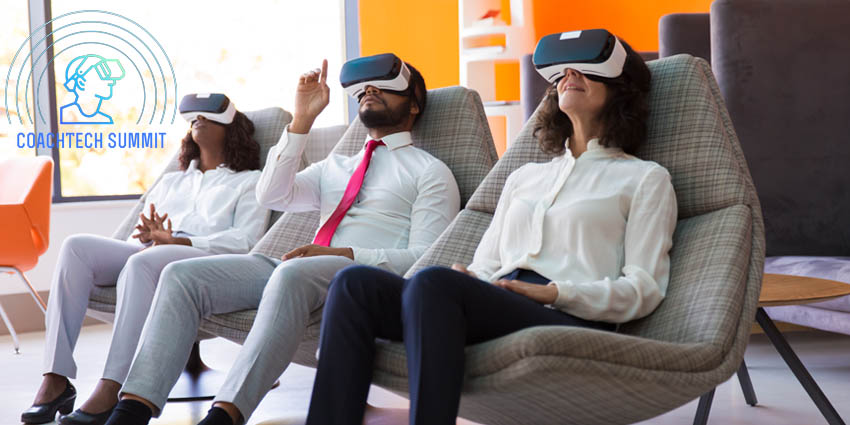The rise of extended reality (XR) solutions has prompted a major reassessment of strategy and development in the coaching industry.
Samantha Karlin, TEDx Public Speaker and CEO of Empower Global, opened the Summit with her thoughts on the rise of virtual and augmented reality (VR/AR) solutions in the coaching sector, which she believed were transformative and crucial to the development of both industries.
Mrs Karlin, who works as a Diversity, Equity, and Inclusion (DE&I) trainer, said the emerging technology was an excellent means to offer trainees an “emotional experience”, leading to greater levels social change and impact.
Comparing VR to traditional instructional methods, she explained how PowerPoint presentations could “only do so much” to create social change as the medium was less interactive with learners, stating: “It’s having an experience that’s emotional — that hits you emotionally — that really creates change.”
What do you think? How will the Training and Coaching Industry change? 🤔#HRTraining #skillsdevelopment #xreality #coachtech pic.twitter.com/ns8631blS6
— CoachTechSummit (@CoachTechSummit) September 24, 2021
Karlin also reflected on conversations at a previous event with Rick Martin, Co-Founder of DE&I VR training firm Equal Reality, where she learned how VR could help people “walk in the shoes of somebody else,” citing her experiences with a Rohingya refugee camp virtual experience at the time.
She added such experiences fully immersed learners by blocking out distractions from external sources and delivering content with greater interactions and empathy.
Citing an additional VR module and experiences with a disabled family member, she said,
“Putting this headset on, being in the shoes of the handicapped person, and feeling how people treated you as a child, was just something altogether different, and I was just like, ‘This is going to be transformative’ in terms of creating empathy and getting people to care about things they didn’t care about before”
VR coaching solutions could also offer expansive use cases such as the capacity to treat mental health conditions by affecting neural pathways in the human brain without medication, she explained. Panelists working across sectors in medicine, avatar building, DE&I, and human resources, had also developed numerous key scenarios for the technology to facilitate the future of VR and AR coaching, she concluded.
The ‘Divide’ in VR Coaching
The Summit segued to Sam Isaacson, Head of Coaching Services at Grant Thornton, who revealed how developing VR solutions could unlock greater potential to become “convenient and affordable” to a greater number of people.
Mr Isaacson, who authored the book, ‘How to Thrive as a Coach in a Digital World,’ explained videoconferencing had been initially accessible in specific conferencing rooms.
The technology later evolved over the years as an ubiquitous platform for remote working on PCs and laptops to providing access to an exponentially larger share of the global population, he said.
Current and future VR platforms could deliver similar results for people around the world to meet people in virtual spaces, receive notifications, and access communications channels, he said.
But a disparity between VR coaching and the traditional coaching industry had developed, he told the audience, stating,
“They were talking about a directive process that would take you through a series of steps that were highly immersive, to allow you to experience something from different perspectives in order for you to be trained. That’s just not what coaching is in my world. Coaching is a non-directive conversation, which is kept confidential [and] increases the level of challenge [to] allow people to think for themselves”
He urged the industry to develop virtual coaching by “not talking about VR coaching tools” with predefined outcomes, but rather collaborative tools, adding the gap between the traditional and virtual coaching worlds could pose a “challenge” over time.
Looking at your reflection in a mirror within Virtual Reality with @UnrealEngine Metahuman technology #embodiment pic.twitter.com/ZS84G4Yq6p
— Equal Reality (@Equal_Reality) April 22, 2021
Speaking on videoconferencing, he said Zoom was a “horribly intense experience” that provided little feedback to people communicating on computer screens. Coaching required trainers to build human connections with body language, eye contact, and other social cues.
VR also provided lower latency connections where groups of people in a virtual space could sing songs or perform tasks in real-time due to simpler points of access compared with videoconferencing.
Isaacson continued, echoing Mrs Karlin’s points on the benefits of VR coaching, stating,
“Because you’re in this enclosed world, there aren’t these distractions such as emails, and if I wanted to share some content for [groups] to share an interesting coaching model, I don’t need to relegate my face to a tiny corner. I’m able to keep the attention of [those I’m coaching] to share that with them in a much more interactive, pleasant way”
The CoachTech Summit 2021 aims to raise awareness on the potential of VR solutions to facilitate training for the global coaching industry, and gathered several key thought leaders in the industry to lead discussions on the future of using extended reality (XR) solutions in the sector.
Speakers included Sarah Hill, Chief Executive of Healium, Prof David Clutterbuck, Co-Founder of the European Mentoring and Coaching Council (EMCC), Christophe Mallet, CEO of Bodyswaps, Rick Martin of Equal Reality, Sophie Thompson, Co-Founder of VirtualSpeech, Kyle Jackson, Co-Founder and CEO of Talespin, and Dana Maria Faneker, Founder of CaptainVR, and many others.
The Summit also comes amid a wave of training solutions developed for top global firms in banking, consultancy, military, education, construction, firefighting and first responding, and others, many who have reported a massive rise in learner retention and engagement from trainees.







